新概念英语第一册第99-100课课件(共27张PPT)
文档属性
| 名称 | 新概念英语第一册第99-100课课件(共27张PPT) |
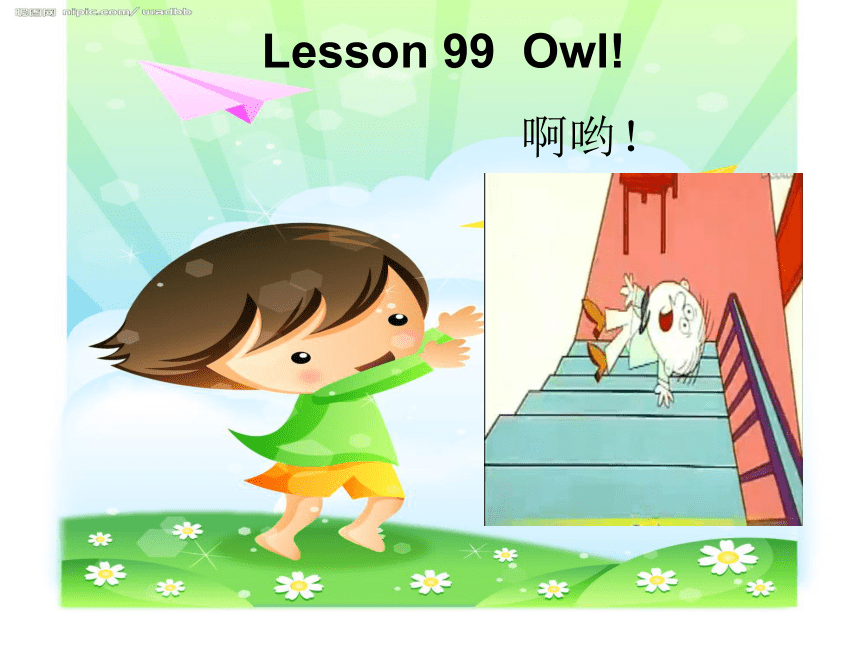
|
|
| 格式 | ppt | ||
| 文件大小 | 588.5KB | ||
| 资源类型 | 教案 | ||
| 版本资源 | 新概念英语 | ||
| 科目 | 英语 | ||
| 更新时间 | 2023-10-06 00:00:00 | ||
图片预览

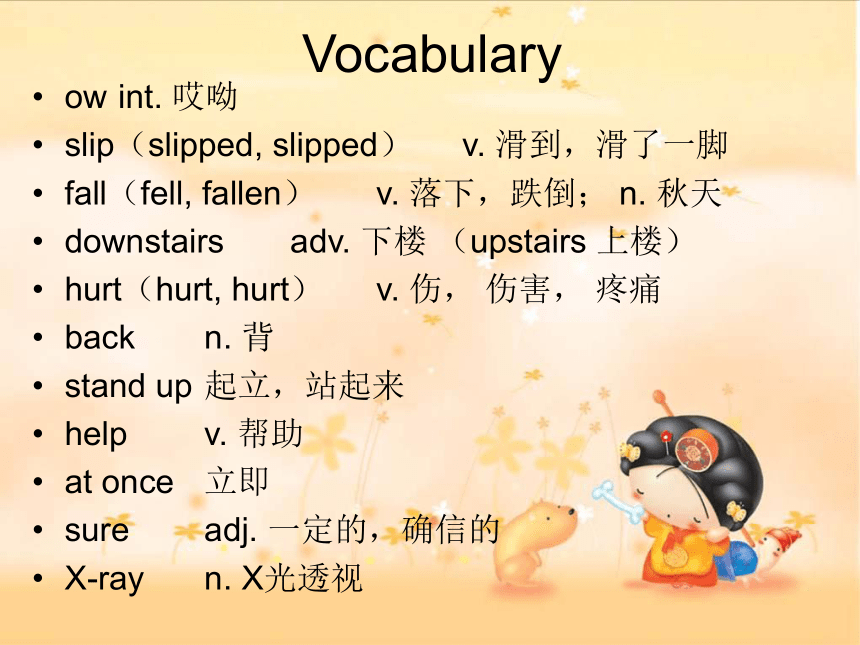
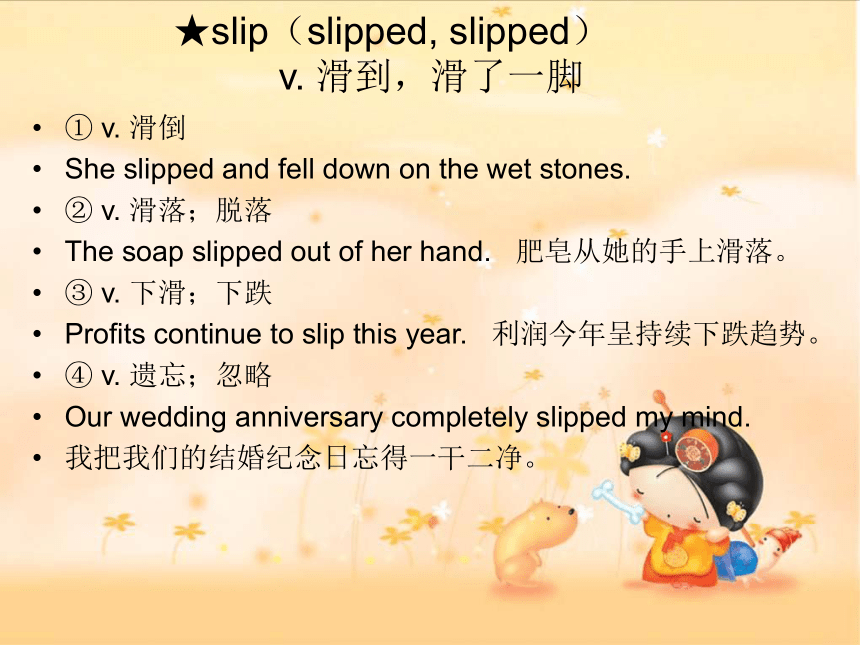
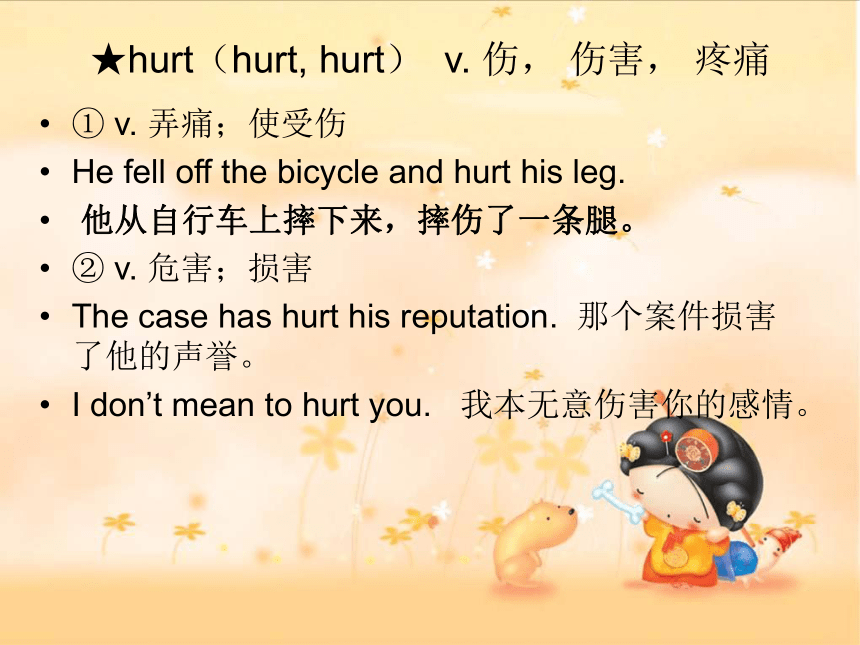
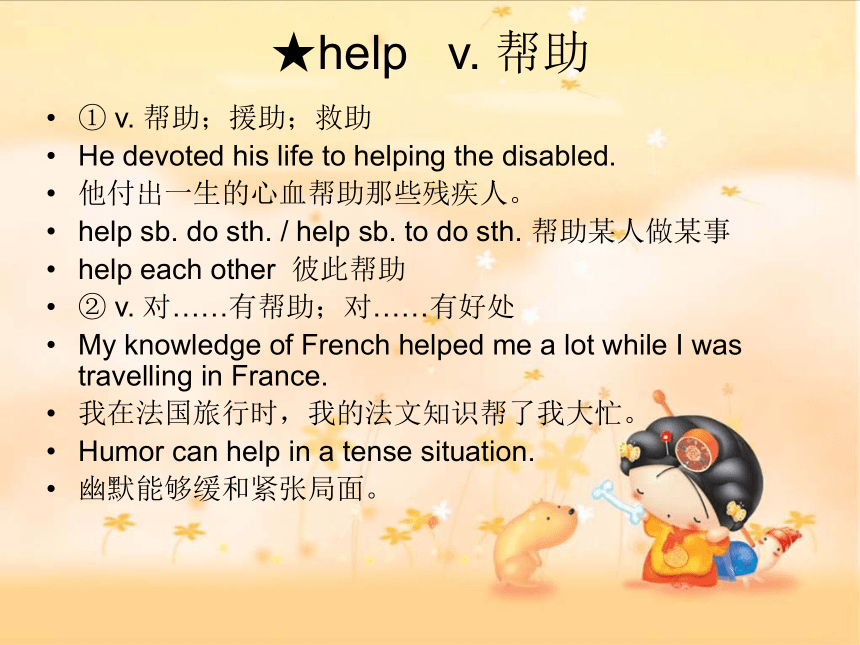
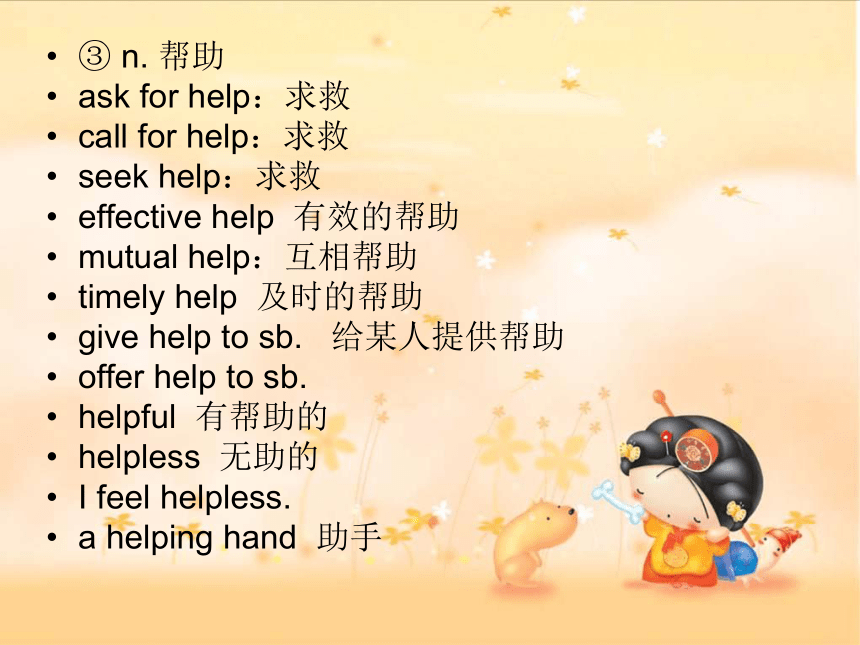
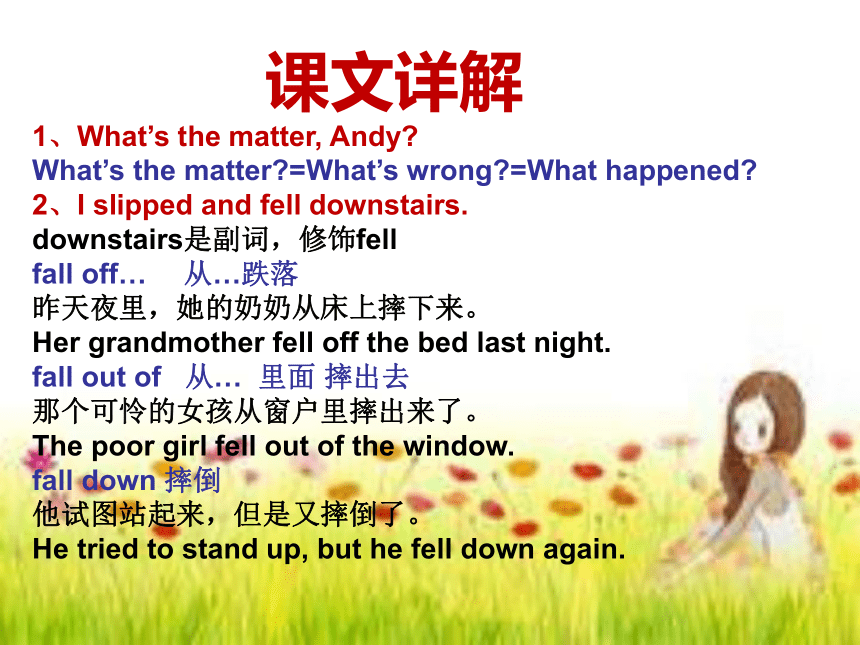
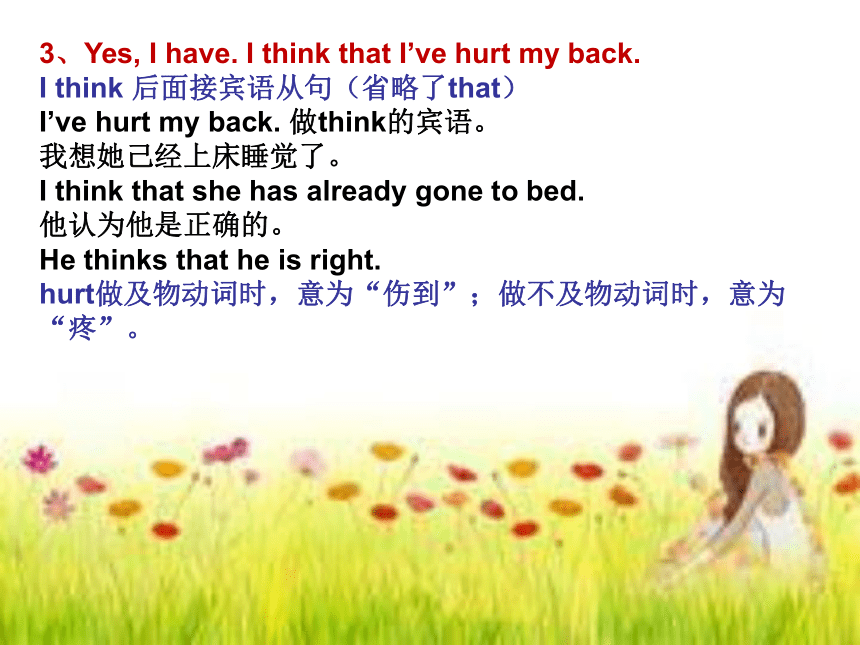
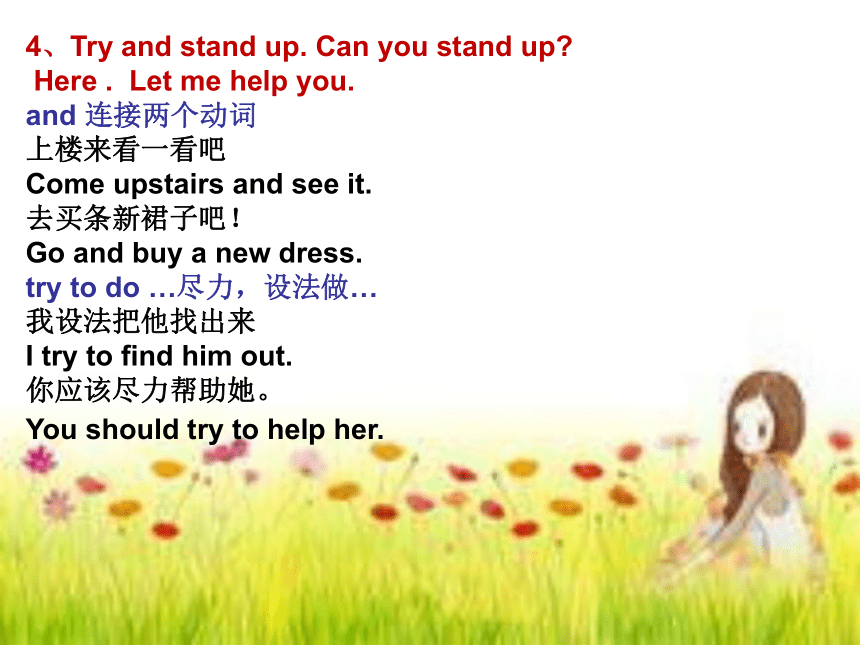
文档简介
(共27张PPT)
Lesson 99 Owl!
啊哟!
Vocabulary
ow int. 哎呦
slip(slipped, slipped) v. 滑到,滑了一脚
fall(fell, fallen) v. 落下,跌倒; n. 秋天
downstairs adv. 下楼 (upstairs 上楼)
hurt(hurt, hurt) v. 伤, 伤害, 疼痛
back n. 背
stand up 起立,站起来
help v. 帮助
at once 立即
sure adj. 一定的,确信的
X-ray n. X光透视
★slip(slipped, slipped)
v. 滑到,滑了一脚
① v. 滑倒
She slipped and fell down on the wet stones.
② v. 滑落;脱落
The soap slipped out of her hand. 肥皂从她的手上滑落。
③ v. 下滑;下跌
Profits continue to slip this year. 利润今年呈持续下跌趋势。
④ v. 遗忘;忽略
Our wedding anniversary completely slipped my mind.
我把我们的结婚纪念日忘得一干二净。
★hurt(hurt, hurt) v. 伤, 伤害, 疼痛
① v. 弄痛;使受伤
He fell off the bicycle and hurt his leg.
他从自行车上摔下来,摔伤了一条腿。
② v. 危害;损害
The case has hurt his reputation. 那个案件损害了他的声誉。
I don’t mean to hurt you. 我本无意伤害你的感情。
★help v. 帮助
① v. 帮助;援助;救助
He devoted his life to helping the disabled.
他付出一生的心血帮助那些残疾人。
help sb. do sth. / help sb. to do sth. 帮助某人做某事
help each other 彼此帮助
② v. 对……有帮助;对……有好处
My knowledge of French helped me a lot while I was travelling in France.
我在法国旅行时,我的法文知识帮了我大忙。
Humor can help in a tense situation.
幽默能够缓和紧张局面。
③ n. 帮助
ask for help:求救
call for help:求救
seek help:求救
effective help 有效的帮助
mutual help:互相帮助
timely help 及时的帮助
give help to sb. 给某人提供帮助
offer help to sb.
helpful 有帮助的
helpless 无助的
I feel helpless.
a helping hand 助手
课文详解
1、What’s the matter, Andy
What’s the matter =What’s wrong =What happened
2、I slipped and fell downstairs.
downstairs是副词,修饰fell
fall off… 从…跌落
昨天夜里,她的奶奶从床上摔下来。
Her grandmother fell off the bed last night.
fall out of 从… 里面 摔出去
那个可怜的女孩从窗户里摔出来了。
The poor girl fell out of the window.
fall down 摔倒
他试图站起来,但是又摔倒了。
He tried to stand up, but he fell down again.
3、Yes, I have. I think that I’ve hurt my back.
I think 后面接宾语从句(省略了that)
I’ve hurt my back. 做think的宾语。
我想她己经上床睡觉了。
I think that she has already gone to bed.
他认为他是正确的。
He thinks that he is right.
hurt做及物动词时,意为“伤到”;做不及物动词时,意为“疼”。
4、Try and stand up. Can you stand up
Here . Let me help you.
and 连接两个动词
上楼来看一看吧
Come upstairs and see it.
去买条新裙子吧!
Go and buy a new dress.
try to do …尽力,设法做…
我设法把他找出来
I try to find him out.
你应该尽力帮助她。
You should try to help her.
I’m sorry , Lucy.
I’m afraid that I can’t get up .
1.get up,站起来。 这一短语还可表示“起床”。
2.be afraid that,想,恐怕;
be sure that, 想,认为。
这两个结构后面通常接从句,在口语中有时that可省略。
I am afraid I can't help you. 恐怕我帮不了你。
I'm sure that everything will be better by then.
我相信到那时一切都会更美好。
I think that the doctor had better see you. I’ll phone Dr. Carter.
had better do sth 最好…
她最好给她的妈妈打个电话。
She’d better call her mother now.
phone the doctor = call the doctor
给医生打电话
5、The doctor says (that) he will come at once.
她说她非常喜欢音乐。
She says that she likes music very much.
at once 马上,立刻
= immediately = right away,常用于一般将来时。
6、I'm sure (that) you need an X-ray.
=I’m sure (that) the doctor needs to X-ray your back.
明天我要去做一个颈部的X光透视。
I will X-ray my neck tomorrow.
Grammar in use :
宾语从句
宾语从句在句中作宾语,一般用that引导,但在口语中经常省略掉that。可用在say,think,believe,hope,know,understand,suppose等动词之后;也可用在某些描写感情的形容词之后,如afraid,sure,sorry,glad等之后。
如果间接引语中的引述动词是现在时,那么其后的时态通常与原来口头陈述句的时态相同。
I know that I can repair this car.
I am sorry that you are ill.
宾语从句还可以由when,where,what,why,how以及if和whether来引导,而它们在句中不能省略,且宾语从句通常都应以陈述句的形式出现。
S +be adj./v. +if +一般疑问句
S +be adj./v. +特殊疑问句 +陈述句
I want to know if you went to London last week.
I don’t know what you are talking about.
使用宾语从句要注意的3个问题:
1.形式宾语it:如宾语从句后有补语,要用形式宾语it来代替,而将从句放到补语的后面去。
e.g. He has made it clear that the meeting
will not be hold.
2. 宾语从句否定意义的转移:在think、believe、
suppose、except等后的宾语中,如从句谓语是
否定的,一般将not移至主句谓语,而将从句宾语变
为肯定形式。即:否定前移。
e.g. 我想他没时间玩足球。
I think that he doesn’t have time to play football.
I don’t think that he has time to play football.
3.反意疑问句:宾语从句的主句是主语+think (except, suppose, believe, imagine)时,附加疑问句部分要根据主句的主语而定:当主语是第一人称时,要根据从句而定;主语是第二、三人称时,与主句保持一致,并且要注意否定前移。
e.g. I don’t think he is serious,________
You believe she is a good teacher, ________
is he
don’t you
类型一:引导词的运用
1 I don’t know ___________or not.
A. whether he is at home
B. if he is at home
C. that he is at home
D. whether is he at home
2 This depends on _________ the weather is fine.
A. which B. whether C. if D. that
3 The teacher asked the new student ________
class he was in.
A. which B. where C. if D. that
A
B
B
A
4 I don’t know ________ Mr. Green will come
to see us. He’ll help us with our English.
A. why B. when C. how D. where
5 Be careful! Don’t break the bottles. Do you
hear ______ I said David
Yes, Mum
A. what B. that C. why D. if
6 Do you know _______ Mr. Black’s address is
He may live at NO.18 or No. 19 of Bridge
Street. I’m not sure of ______.
A. where, which B. where, what
C. what, which D. what, where
B
B
A
C
7 There is not much difference between the two.
I really don’t know _____.
A. what should I choose
B. which I should choose
C. which should I choose
D. what I should choose
类型二:宾语从句的语序——陈述句语序
1 Did you find out ______
A. she was looking for whose child
B. whose child was she looking for
C. whose child she is looking for
D. whose child she was looking for
B
D
2 Are you interested in _____
A. how did he do it B. he did it how
C. how he did it D. he how did it
3 I don’t know _____. Can you tell me
A. how the two players are old
B. how old are the two players
C. the two players are how old
D. how old the two players are
4 What did the scientist say
He said he wondered if _____ into space
by spaceship one day.
A. he had to fly B. he could fly
C. can he fly D. could he fly
C
D
B
5 Excuse me, sir. Could you tell me ____
A. Where the bank nearest
B. where is the nearest bank
C. where the nearest bank is
D. the nearest bank is where
6 I hear we’ll have a new teacher this term.
Really
Do you know____________________
A. what subject does he teach
B. What subject will he teach
C. what subject is he going to teach
D. what subject he teaches
C
D
Lesson 100 He says that …
She says that …
They say that …
听力部分
直接引语和间接引语
直接引语就是直接引用说话人原来所说的话;间接引语就是原话的转述。直接引语放在引号里,间接引语是把说话人的原话变成宾语从句。
间接引语中,宾语从句中的动词与主句中的主要动词在时态上必须保持一致。
把直接陈述改为间接陈述改为间接引语时,谓语动词形式的变化体现在人称上。
She says she’s staying at a Youth Hostel.
He says that… She says that… They say that
他说他头疼。
He says that he has a headache.
他说他想理发。
He says that he wants a haircut.
他们说他们在洗碗。
They say that they are washing dishes.
他们说他们要去渡假。
They say that they are going to have a holiday.
He is drinking his milk.
He says that he is drinking his milk.
1 She has found her pen.
2 They must remain here.
3 He remembers you.
4 She doesn’t speak English.
5 They are washing the dishes.
Homework
1. To finish the exercises after the text.
2. To practise the structures learned during the class.
Lesson 99 Owl!
啊哟!
Vocabulary
ow int. 哎呦
slip(slipped, slipped) v. 滑到,滑了一脚
fall(fell, fallen) v. 落下,跌倒; n. 秋天
downstairs adv. 下楼 (upstairs 上楼)
hurt(hurt, hurt) v. 伤, 伤害, 疼痛
back n. 背
stand up 起立,站起来
help v. 帮助
at once 立即
sure adj. 一定的,确信的
X-ray n. X光透视
★slip(slipped, slipped)
v. 滑到,滑了一脚
① v. 滑倒
She slipped and fell down on the wet stones.
② v. 滑落;脱落
The soap slipped out of her hand. 肥皂从她的手上滑落。
③ v. 下滑;下跌
Profits continue to slip this year. 利润今年呈持续下跌趋势。
④ v. 遗忘;忽略
Our wedding anniversary completely slipped my mind.
我把我们的结婚纪念日忘得一干二净。
★hurt(hurt, hurt) v. 伤, 伤害, 疼痛
① v. 弄痛;使受伤
He fell off the bicycle and hurt his leg.
他从自行车上摔下来,摔伤了一条腿。
② v. 危害;损害
The case has hurt his reputation. 那个案件损害了他的声誉。
I don’t mean to hurt you. 我本无意伤害你的感情。
★help v. 帮助
① v. 帮助;援助;救助
He devoted his life to helping the disabled.
他付出一生的心血帮助那些残疾人。
help sb. do sth. / help sb. to do sth. 帮助某人做某事
help each other 彼此帮助
② v. 对……有帮助;对……有好处
My knowledge of French helped me a lot while I was travelling in France.
我在法国旅行时,我的法文知识帮了我大忙。
Humor can help in a tense situation.
幽默能够缓和紧张局面。
③ n. 帮助
ask for help:求救
call for help:求救
seek help:求救
effective help 有效的帮助
mutual help:互相帮助
timely help 及时的帮助
give help to sb. 给某人提供帮助
offer help to sb.
helpful 有帮助的
helpless 无助的
I feel helpless.
a helping hand 助手
课文详解
1、What’s the matter, Andy
What’s the matter =What’s wrong =What happened
2、I slipped and fell downstairs.
downstairs是副词,修饰fell
fall off… 从…跌落
昨天夜里,她的奶奶从床上摔下来。
Her grandmother fell off the bed last night.
fall out of 从… 里面 摔出去
那个可怜的女孩从窗户里摔出来了。
The poor girl fell out of the window.
fall down 摔倒
他试图站起来,但是又摔倒了。
He tried to stand up, but he fell down again.
3、Yes, I have. I think that I’ve hurt my back.
I think 后面接宾语从句(省略了that)
I’ve hurt my back. 做think的宾语。
我想她己经上床睡觉了。
I think that she has already gone to bed.
他认为他是正确的。
He thinks that he is right.
hurt做及物动词时,意为“伤到”;做不及物动词时,意为“疼”。
4、Try and stand up. Can you stand up
Here . Let me help you.
and 连接两个动词
上楼来看一看吧
Come upstairs and see it.
去买条新裙子吧!
Go and buy a new dress.
try to do …尽力,设法做…
我设法把他找出来
I try to find him out.
你应该尽力帮助她。
You should try to help her.
I’m sorry , Lucy.
I’m afraid that I can’t get up .
1.get up,站起来。 这一短语还可表示“起床”。
2.be afraid that,想,恐怕;
be sure that, 想,认为。
这两个结构后面通常接从句,在口语中有时that可省略。
I am afraid I can't help you. 恐怕我帮不了你。
I'm sure that everything will be better by then.
我相信到那时一切都会更美好。
I think that the doctor had better see you. I’ll phone Dr. Carter.
had better do sth 最好…
她最好给她的妈妈打个电话。
She’d better call her mother now.
phone the doctor = call the doctor
给医生打电话
5、The doctor says (that) he will come at once.
她说她非常喜欢音乐。
She says that she likes music very much.
at once 马上,立刻
= immediately = right away,常用于一般将来时。
6、I'm sure (that) you need an X-ray.
=I’m sure (that) the doctor needs to X-ray your back.
明天我要去做一个颈部的X光透视。
I will X-ray my neck tomorrow.
Grammar in use :
宾语从句
宾语从句在句中作宾语,一般用that引导,但在口语中经常省略掉that。可用在say,think,believe,hope,know,understand,suppose等动词之后;也可用在某些描写感情的形容词之后,如afraid,sure,sorry,glad等之后。
如果间接引语中的引述动词是现在时,那么其后的时态通常与原来口头陈述句的时态相同。
I know that I can repair this car.
I am sorry that you are ill.
宾语从句还可以由when,where,what,why,how以及if和whether来引导,而它们在句中不能省略,且宾语从句通常都应以陈述句的形式出现。
S +be adj./v. +if +一般疑问句
S +be adj./v. +特殊疑问句 +陈述句
I want to know if you went to London last week.
I don’t know what you are talking about.
使用宾语从句要注意的3个问题:
1.形式宾语it:如宾语从句后有补语,要用形式宾语it来代替,而将从句放到补语的后面去。
e.g. He has made it clear that the meeting
will not be hold.
2. 宾语从句否定意义的转移:在think、believe、
suppose、except等后的宾语中,如从句谓语是
否定的,一般将not移至主句谓语,而将从句宾语变
为肯定形式。即:否定前移。
e.g. 我想他没时间玩足球。
I think that he doesn’t have time to play football.
I don’t think that he has time to play football.
3.反意疑问句:宾语从句的主句是主语+think (except, suppose, believe, imagine)时,附加疑问句部分要根据主句的主语而定:当主语是第一人称时,要根据从句而定;主语是第二、三人称时,与主句保持一致,并且要注意否定前移。
e.g. I don’t think he is serious,________
You believe she is a good teacher, ________
is he
don’t you
类型一:引导词的运用
1 I don’t know ___________or not.
A. whether he is at home
B. if he is at home
C. that he is at home
D. whether is he at home
2 This depends on _________ the weather is fine.
A. which B. whether C. if D. that
3 The teacher asked the new student ________
class he was in.
A. which B. where C. if D. that
A
B
B
A
4 I don’t know ________ Mr. Green will come
to see us. He’ll help us with our English.
A. why B. when C. how D. where
5 Be careful! Don’t break the bottles. Do you
hear ______ I said David
Yes, Mum
A. what B. that C. why D. if
6 Do you know _______ Mr. Black’s address is
He may live at NO.18 or No. 19 of Bridge
Street. I’m not sure of ______.
A. where, which B. where, what
C. what, which D. what, where
B
B
A
C
7 There is not much difference between the two.
I really don’t know _____.
A. what should I choose
B. which I should choose
C. which should I choose
D. what I should choose
类型二:宾语从句的语序——陈述句语序
1 Did you find out ______
A. she was looking for whose child
B. whose child was she looking for
C. whose child she is looking for
D. whose child she was looking for
B
D
2 Are you interested in _____
A. how did he do it B. he did it how
C. how he did it D. he how did it
3 I don’t know _____. Can you tell me
A. how the two players are old
B. how old are the two players
C. the two players are how old
D. how old the two players are
4 What did the scientist say
He said he wondered if _____ into space
by spaceship one day.
A. he had to fly B. he could fly
C. can he fly D. could he fly
C
D
B
5 Excuse me, sir. Could you tell me ____
A. Where the bank nearest
B. where is the nearest bank
C. where the nearest bank is
D. the nearest bank is where
6 I hear we’ll have a new teacher this term.
Really
Do you know____________________
A. what subject does he teach
B. What subject will he teach
C. what subject is he going to teach
D. what subject he teaches
C
D
Lesson 100 He says that …
She says that …
They say that …
听力部分
直接引语和间接引语
直接引语就是直接引用说话人原来所说的话;间接引语就是原话的转述。直接引语放在引号里,间接引语是把说话人的原话变成宾语从句。
间接引语中,宾语从句中的动词与主句中的主要动词在时态上必须保持一致。
把直接陈述改为间接陈述改为间接引语时,谓语动词形式的变化体现在人称上。
She says she’s staying at a Youth Hostel.
He says that… She says that… They say that
他说他头疼。
He says that he has a headache.
他说他想理发。
He says that he wants a haircut.
他们说他们在洗碗。
They say that they are washing dishes.
他们说他们要去渡假。
They say that they are going to have a holiday.
He is drinking his milk.
He says that he is drinking his milk.
1 She has found her pen.
2 They must remain here.
3 He remembers you.
4 She doesn’t speak English.
5 They are washing the dishes.
Homework
1. To finish the exercises after the text.
2. To practise the structures learned during the class.
同课章节目录
